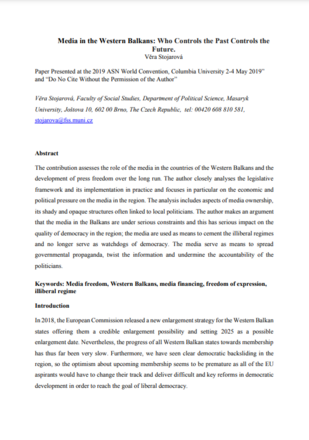
The progress of Western Balkan countries toward EU enlargement has been slow, hindered by democratic backsliding. Media freedom, a cornerstone of democracy, faces critical challenges in the region. Illiberal regimes use indirect methods like restrictive press laws, SLAPPs, selective funding, and persecution of independent outlets to suppress dissent and control information.
State-owned television dominates the media landscape, serving as the primary source of information for 50-60% of the population. Private broadcasters focus mainly on entertainment, while print media and radio are declining, struggling to adapt to digital platforms. The region also suffers from media fragmentation, as seen in Albania, Macedonia, and Montenegro, and ethnic divisions in Bosnia and Herzegovina, where media outlets serve specific ethnic groups.
Social media has gained popularity but contributes to fake news and hate speech. Political and economic pressures remain significant, with governments using media for propaganda, silencing opposition, and attacking critical journalists. Notable examples include Albania’s Prime Minister Edi Rama and Serbia’s President Aleksandar Vučić, who have clamped down on media freedom. Journalists face harassment, violent attacks, and imprisonment, such as Jovo Martinović in Montenegro and Parim Olluri in Kosovo. Pro-government media thrive due to state funding, while independent outlets struggle with financial constraints, low journalist salaries, and self-censorship.
The erosion of press freedom is evident across the region. Macedonia ranks the lowest among Western Balkan states for press freedom, with Bosnia and Herzegovina only slightly better. Serbia, Montenegro, and Croatia are also increasingly prone to political interference and journalist harassment.
While media legislation in the region aligns with EU standards, enforcement is inconsistent. Regulatory bodies lack independence, and defamation laws are used to intimidate journalists, with high fines deterring investigative reporting and fostering fear.
Overall, media in the Western Balkans remains trapped in political control, economic dependence, and declining public trust. Although the internet offers alternative information sources, it also enables misinformation. Sporadic efforts at reform, highlight the urgent need for more ambitious changes. Without radical reforms, the media will continue to sustain autocratic regimes rather than promote democratic accountability.
Tags: Western Balkans Media freedom Rule of LawThe content of this article can be used according to the terms of Creative Commons: Attribution-NonCommercial 4.0 International (CC BY-NC 4.0) . To do so use the the wording "this article was originally published on the Resource Centre on Media Freedom in Europe" including a direct active link to the original article page.

